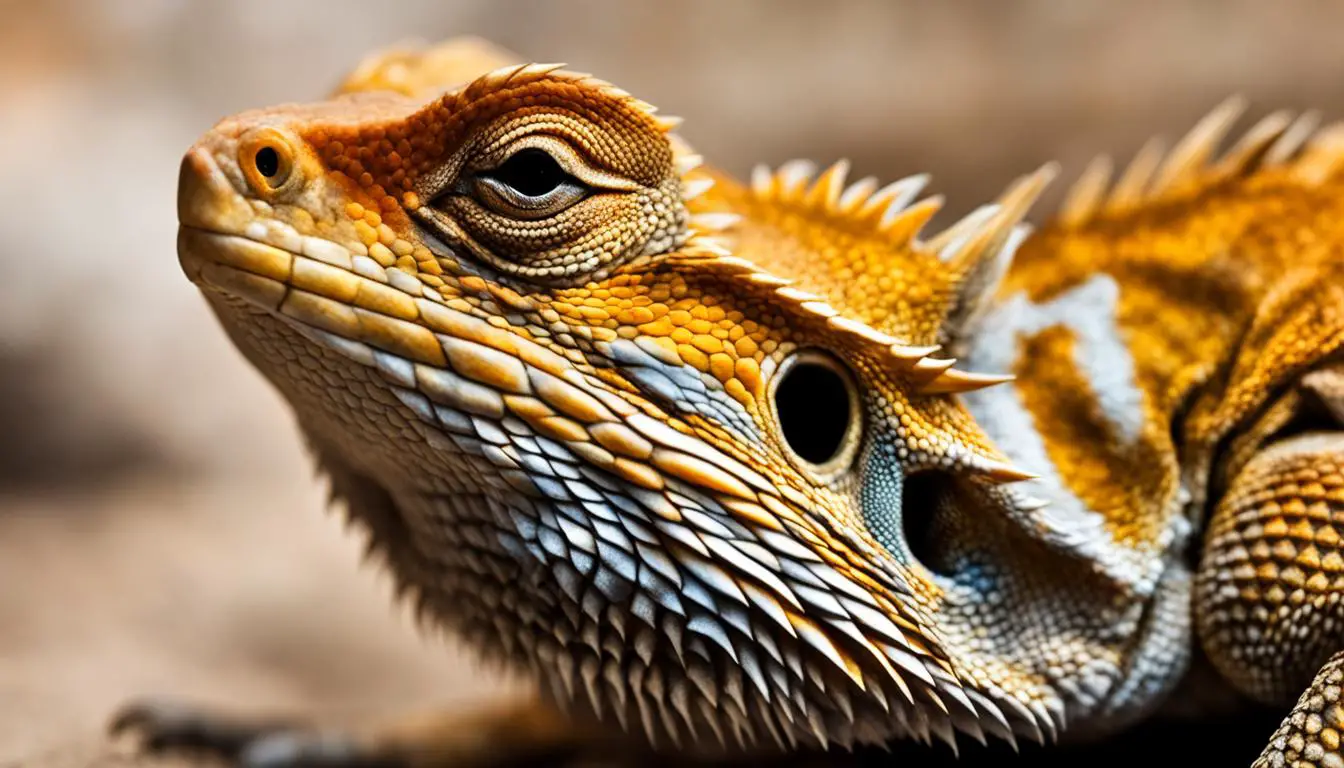Having a bearded dragon as a pet can be a wonderful experience, but it’s important to understand their behaviors and what they may indicate. One common behavior that often raises concerns is when a bearded dragon keeps closing its eyes. In this article, we will explore the reasons behind this behavior and provide insights into different causes and solutions.
It’s worth noting that closing their eyes can be a sign of various issues, including discomfort or health problems. By understanding the underlying reasons, you can take appropriate action to ensure the well-being of your beloved pet.
Key Takeaways:
- Bearded dragons may close their eyes due to a variety of reasons, including discomfort or health issues.
- Understanding the context of their behavior is crucial to providing appropriate care and avoiding potential hazards.
- Seeking veterinary advice is essential, especially if the behavior is persistent or accompanied by other symptoms.
- Respecting their boundaries and creating a suitable environment will contribute to the overall well-being of your bearded dragon.
- Regular monitoring and proper care are paramount to ensure a happy and healthy life for your pet.
Bearded Dragon Keeps Closing Eyes
Why Bearded Dragons Close Their Eyes When Being Pet Or Held
Bearded dragons are known for their unique behaviors, and one common behavior that owners may notice is their tendency to close their eyes when being pet or held. While it might be tempting to interpret this behavior as a sign of contentment, it’s important to understand that bearded dragons close their eyes in these situations because they feel scared or uncomfortable, not because they are enjoying the interaction.
This behavior serves as a coping mechanism and a way for bearded dragons to communicate their discomfort. It is a warning sign that they need some space and that their boundaries are being pushed. By recognizing and respecting this behavior, owners can avoid triggering aggression or causing unnecessary stress to their bearded dragons.
It’s worth noting that not all bearded dragons enjoy physical contact or being handled. Each dragon has its own unique personality and preferences when it comes to interaction. Some may tolerate handling more than others, while some may even become aggressive if they feel threatened or overwhelmed. Therefore, it’s crucial for owners to pay attention to their bearded dragon’s body language and react accordingly to ensure their well-being. bearded dragon keeps swallowing
Understanding Bearded Dragon Behavior
Bearded dragons communicate through various behaviors, and closing their eyes when being pet or held is just one of many ways they express their discomfort. By observing and understanding these behaviors, owners can build a better relationship with their bearded dragons and provide them with the care they need.
Bearded Dragon Behavior in the Wild
In their natural habitat, bearded dragons exhibit fascinating behavior that helps them survive and thrive. Understanding their predatory instincts and communication methods can provide valuable insights into their behavior in captivity. Here are some key aspects of bearded dragon behavior in the wild:
Predatory Behavior
Bearded dragons are skilled predators and use eye contact as a method of stalking their prey. Extended eye contact serves as a warning to potential meals, indicating that an attack is imminent. In the wild, bearded dragons rely on this behavior to communicate their intentions and establish dominance in their territory.
Despite being kept as pets, bearded dragons retain their instinctual behaviors, including the use of eye contact. When handled, they may close their eyes to signal discomfort and a desire to escape the situation, just as they would in the wild.
Hunting Strategies
Bearded dragons are opportunistic hunters and use a combination of ambush and chase tactics to catch their prey. They are particularly skilled at hunting insects, small mammals, and sometimes even other reptiles. Their ability to use eye contact and body language effectively contributes to their success as hunters.
By closing their eyes or avoiding prolonged eye contact, bearded dragons can camouflage themselves and make surprise attacks on unsuspecting prey. This behavior allows them to minimize the chances of their prey escaping or detecting their presence.
Understanding the natural behavior of bearded dragons can help owners interpret their actions and provide a suitable environment where they feel safe and secure. By respecting their instincts and allowing them to behave naturally, we can ensure the well-being of these fascinating creatures.
| Bearded Dragon Behavior in the Wild | Description |
|---|---|
| Predatory Behavior | Bearded dragons use eye contact as a predatory behavior to stalk their prey and communicate their intentions. |
| Hunting Strategies | Bearded dragons employ ambush and chase tactics to capture their prey, using eye contact and body language to their advantage. |
By observing and understanding the behavior of bearded dragons in the wild, we can provide a more enriching and fulfilling environment for these incredible reptiles.
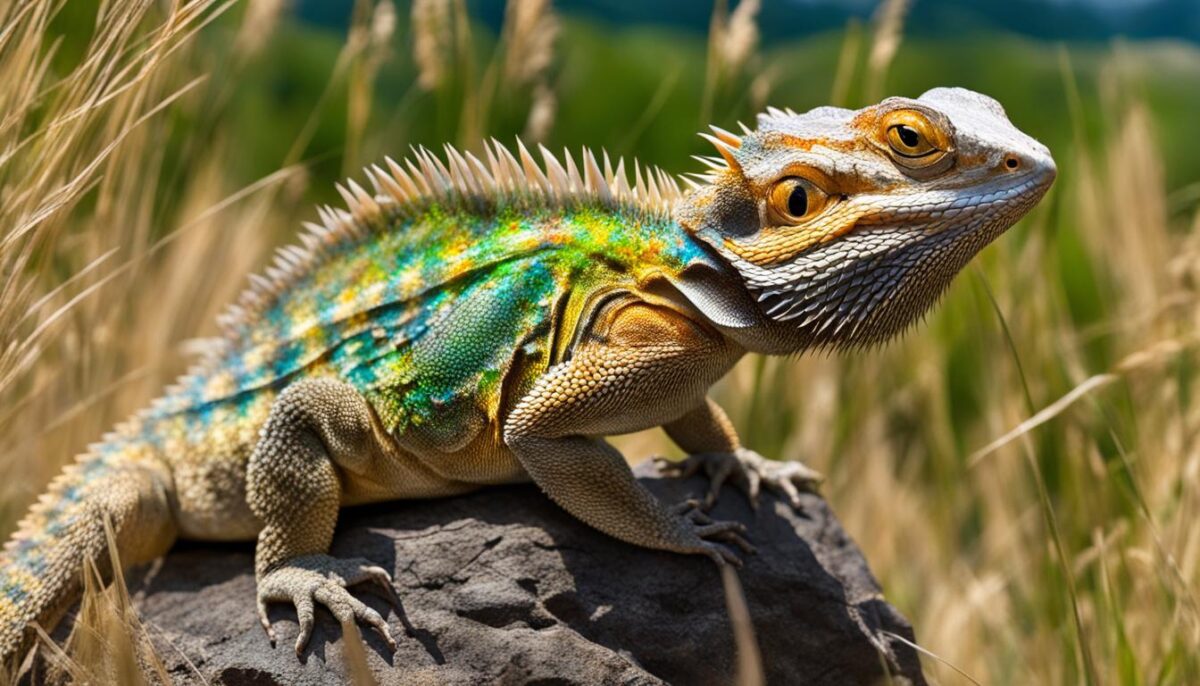
What This Means For You
Understanding the behavior of your bearded dragon is crucial for their well-being during handling and interaction. When your bearded dragon closes its eyes, it is a clear indication of discomfort and the need for space. It is important to respect their boundaries and provide them with the comfort they require. Ignoring their signs of discomfort can lead to aggression and potential injuries. By creating a safe and comfortable environment for your bearded dragon, you can ensure a positive and enjoyable interaction. bearded dragon swallowing problems
Proper interpretation of your bearded dragon’s behavior is key to maintaining a positive relationship. Closing their eyes when being pet or held is a warning sign that they are scared or uncomfortable. It is not a sign of happiness, as commonly believed. By understanding their communication, you can avoid triggering aggressive actions and establish trust with your pet. Remember that not all bearded dragons enjoy physical contact, and their preference for interaction may vary.
To ensure the well-being of your bearded dragon, it is essential to provide them with the space they need and respect their boundaries. By doing so, you can prevent potential injuries and aggression. Additionally, regular veterinary check-ups and monitoring their behavior are important for their overall health. By proactively providing a suitable environment, balanced diet, and seeking professional advice when needed, you can ensure the optimal care and well-being of your beloved bearded dragon.
Table: Tips for Handling Bearded Dragons Safely
| Tip | Description |
|---|---|
| Approach from the side | When approaching your bearded dragon, do so from the side rather than from above. This helps them feel less threatened and more comfortable. |
| Avoid sensitive areas | Avoid touching sensitive areas of your bearded dragon, such as the tail or underside. These areas can cause discomfort or trigger defensive responses. |
| Provide support | When handling your bearded dragon, always provide support by using both hands. This helps them feel secure and reduces their stress levels. |
| Hand feeding | Hand feeding your bearded dragon can help build trust and positive associations with human contact. It also allows them to feel in control of their food intake. |
“Understanding why bearded dragons close their eyes is crucial for their proper care and handling.”
By implementing these tips and understanding the behavior of your bearded dragon, you can create a safe and comfortable environment for them. Building trust and respecting their boundaries will lead to a positive and fulfilling relationship with your pet.
Other Causes For Closed Eyes
While closing their eyes when being pet or held is often a sign of discomfort or fear, there are other reasons why a bearded dragon may close its eyes. It’s important for owners to be aware of these potential causes and seek proper care if necessary. bearded dragon swallowing food whole
Eye Infection
One common reason for closed eyes in bearded dragons is an eye infection. This can occur due to poor hygiene, foreign objects, or bacteria. If you notice any discharge, redness, or swelling around the eyes, it’s important to consult a veterinarian for appropriate treatment. bearded dragon keeps gulping
Dehydration
Bearded dragons are susceptible to dehydration, which can lead to closed or dry eyes. It’s important to ensure that your bearded dragon has access to fresh water at all times and maintain proper humidity levels in their habitat. If you suspect dehydration, consult a veterinarian for guidance on hydration techniques. bearded dragon swallowing food whole
Mites
Mites are another potential cause of closed eyes in bearded dragons. These external parasites can cause discomfort and irritation, leading to excessive blinking or closing of the eyes. Regularly inspect your bearded dragon for any signs of mites and seek veterinary attention if necessary. bearded dragon swallowing rocks bearded dragon swallowing sand
Shedding Issues
During the shedding process, bearded dragons may experience shedding issues around their eyes, leading to closed eyelids. This can occur if the old skin gets stuck or doesn’t peel off properly. Providing proper humidity and gentle assistance during shedding can help prevent complications. bearded dragon swallowing air
| Potential Causes | Symptoms | Treatment |
|---|---|---|
| Eye Infection | Discharge, redness, swelling | Consult a veterinarian for appropriate treatment |
| Dehydration | Dry or closed eyes | Ensure access to fresh water, maintain proper humidity levels, consult a veterinarian if necessary |
| Mites | Excessive blinking or closing of eyes | Inspect for mites, seek veterinary attention if necessary |
| Shedding Issues | Closed eyelids during shedding | Provide proper humidity, offer gentle assistance during shedding |
It’s important to monitor your bearded dragon closely and seek professional advice if you notice any concerning signs or symptoms. By addressing these potential causes, you can ensure the health and well-being of your bearded dragon.
Is This Behavior Different For Baby Bearded Dragons?
Baby bearded dragons, just like their adult counterparts, may exhibit the behavior of closing their eyes when being pet or held. However, their behavior can often be attributed to fear and discomfort rather than aggression. It’s important to understand that baby bearded dragons are naturally more timid and require proper socialization to become comfortable with human interaction. bearded dragon swallowing hazards
Building trust and providing positive experiences are key to helping baby bearded dragons develop a positive relationship with their owners. Slowly introducing handling sessions and allowing the baby bearded dragon to explore their surroundings can help them feel more secure. It’s important to be patient and give the baby bearded dragon time to adjust to their new environment. bearded dragon choking
Handling should be done with care and gentleness, using proper techniques to ensure the safety of both the bearded dragon and the handler. Supporting their body and avoiding sudden movements can go a long way in building trust. It’s also important to remember that baby bearded dragons have delicate skin, so avoiding excessive rough handling is crucial to prevent injuries. bearded dragon regurgitating food
By providing a calm and stress-free environment and gradually increasing interaction, owners can help baby bearded dragons feel more comfortable and secure. It’s important to monitor their behavior and adjust handling techniques accordingly to ensure their well-being and social development.
What Does It Mean When They Only Close One Eye?
If you notice that your bearded dragon is only closing one eye, it could be a sign of eye discomfort or injury. This behavior may indicate that there is an irritant in the eye, such as debris or foreign objects. It could also be a result of an eye infection or an underlying health issue. It’s important to visually inspect the eye and seek veterinary care if needed to ensure the health and well-being of your bearded dragon.
Common causes of eye discomfort in bearded dragons include eye infections, irritation from environmental factors, or injury. In some cases, the eye may appear red, swollen, or have discharge. It’s crucial to address these issues promptly to prevent further complications and discomfort for your pet.
When observing your bearded dragon’s eyes, look for any signs of injury, such as scratches or cuts. Additionally, monitor their behavior for any changes in appetite, lethargy, or excessive rubbing of the eye. If you notice any concerning symptoms or if your bearded dragon’s eye condition worsens, consult a veterinarian who specializes in reptile health for an accurate diagnosis and appropriate treatment.
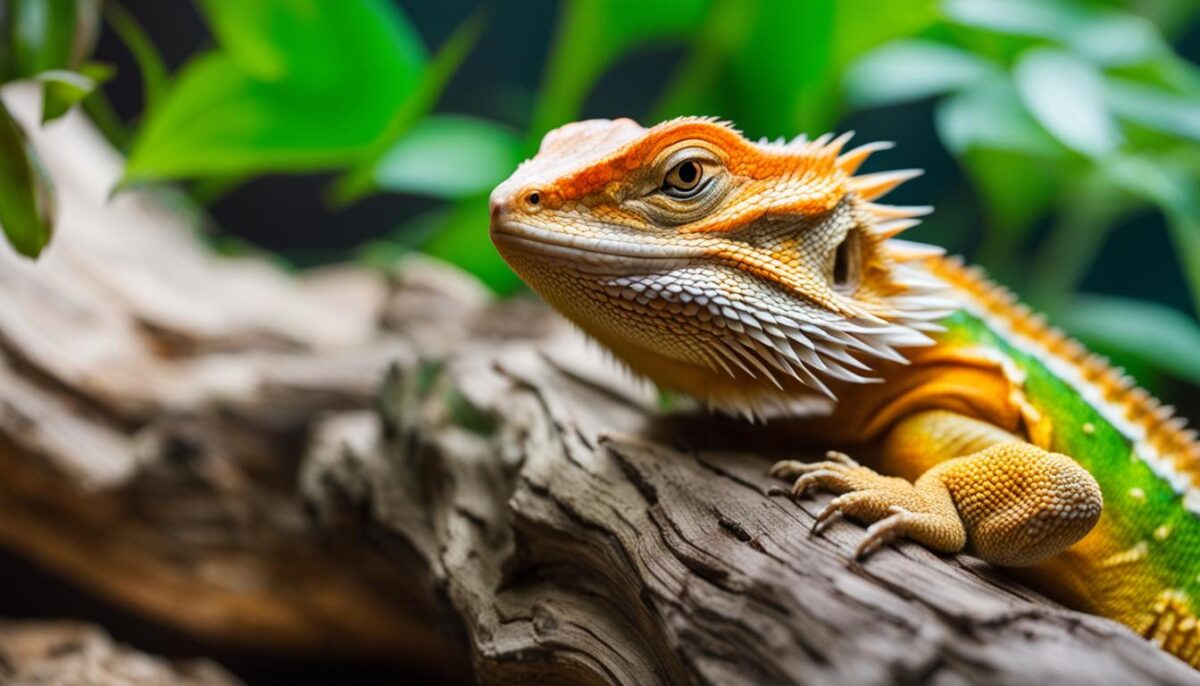
| Cause | Symptoms | Treatment |
|---|---|---|
| Eye infection | Redness, swelling, discharge | Veterinary examination and prescribed medication |
| Irritation from debris or foreign objects | Excessive blinking, tearing, rubbing of the eye | Gentle flushing of the eye and veterinary assessment if needed |
| Eye injury | Visible scratches or cuts on the eye | Veterinary evaluation and treatment |
Conclusion
Understanding why bearded dragons close their eyes is crucial for their proper care and handling. While this behavior is often misunderstood, recognizing signs of discomfort and providing the necessary space can ensure a positive and safe interaction between owners and their bearded dragons.
By respecting a bearded dragon’s boundaries and avoiding physical contact that causes them discomfort, owners can build trust and establish a positive relationship with their reptile companion. It’s important to remember that bearded dragons are individuals with unique preferences for interaction, and forcing interaction can lead to aggression and potential harm.
The key to successful bearded dragon handling is to observe their behavior and respond accordingly. If a bearded dragon closes its eyes or shows signs of discomfort when being pet or held, it’s essential to give them space and allow them to retreat to a safe and secure environment. This will help reduce stress and anxiety, promoting their overall well-being.
Providing a suitable habitat and monitoring their health are also important aspects of caring for bearded dragons. Regular veterinary check-ups, proper nutrition, and maintaining a clean and well-maintained enclosure can help prevent health issues and ensure a happy and healthy life for these fascinating reptiles.
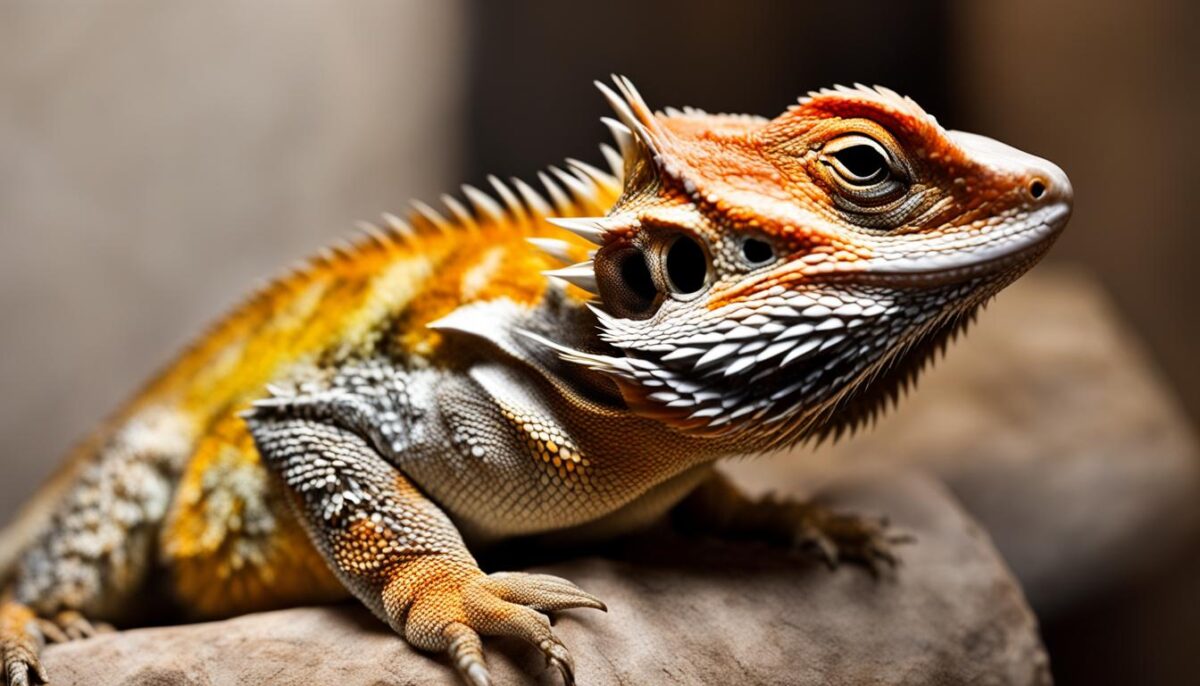
Tips for Handling Bearded Dragons Safely
Handling bearded dragons can be a rewarding experience for both owners and their pets. However, it’s important to handle them safely to ensure their well-being. Here are some tips to help you handle your bearded dragon safely:
- Approach from the side: When picking up your bearded dragon, approach from the side rather than from above. This helps them feel less threatened and more secure.
- Avoid sensitive areas: Be careful not to touch or put pressure on sensitive areas, such as their tail or limbs. These areas can be delicate and prone to injury.
- Provide support: Always support your bearded dragon’s body by using both hands. This helps them feel secure and reduces the risk of them wriggling or jumping out of your hands.
- Hand feeding: Hand feeding your bearded dragon can help build trust and positive associations with human contact. It allows them to approach you voluntarily and reduces the chances of them feeling threatened or stressed.
Remember, each bearded dragon is unique, and their handling preferences may vary. Pay attention to their body language and cues to ensure their comfort and safety. If your bearded dragon shows signs of stress or discomfort during handling, it’s important to give them a break and try again later. Building a trusting relationship takes time and patience.
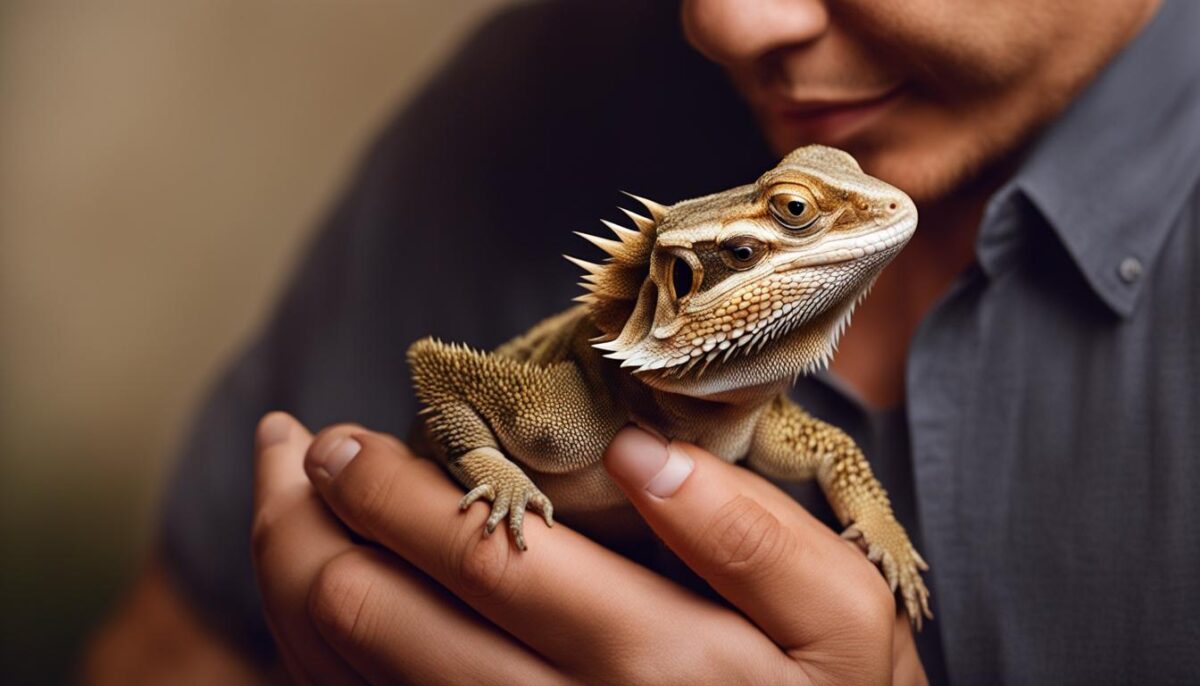
By following these tips, you can create a positive and safe handling experience for both you and your bearded dragon. Remember to always prioritize their well-being and provide them with the space and care they need.
Creating an Ideal Environment for Bearded Dragons
Providing a suitable habitat for your bearded dragon is essential for its health and well-being. Creating an ideal environment includes considerations such as the bearded dragon’s enclosure, temperature, and humidity levels.
Bearded Dragon Enclosure
Bearded dragons require an enclosure that is spacious enough for them to move around comfortably. A glass terrarium or a reptile enclosure made from PVC or wood can be suitable options. Ensure the enclosure has adequate ventilation and secure closures to prevent escapes or injuries. Additionally, it’s important to provide hiding spots and climbing structures, such as rocks or branches, to create a stimulating and enriching environment.
Temperature and Lighting
Bearded dragons are ectothermic, which means they rely on external heat sources to regulate their body temperature. Maintain a basking spot temperature of around 95-105°F (35-40°C) and a cooler side temperature of 80-85°F (27-29°C) for proper thermoregulation. Utilize a combination of heat lamps, such as basking bulbs or ceramic heat emitters, and a full-spectrum UVB light to provide the necessary heat and light for your bearded dragon’s well-being.
Humidity Levels
Bearded dragons require a moderate level of humidity to support their overall health. Aim for a humidity level between 30-40% in the enclosure. Regular misting of the habitat can help maintain adequate humidity levels. It’s important to monitor the humidity using a hygrometer to ensure it remains within the recommended range.
Table: Recommended Habitat Conditions for Bearded Dragons
| Aspect | Ideal Conditions |
|---|---|
| Enclosure | Spacious, well-ventilated, secure closures, hiding spots, climbing structures |
| Temperature | Basking spot: 95-105°F (35-40°C); Cooler side: 80-85°F (27-29°C) |
| Lighting | Full-spectrum UVB light, basking bulbs, ceramic heat emitters |
| Humidity | 30-40% humidity level, regular misting |
Creating an ideal environment for your bearded dragon can contribute to its overall health, happiness, and longevity. By providing the right enclosure, temperature, and humidity conditions, you can ensure a thriving habitat for your beloved reptile companion.
Proper Care and Monitoring of Bearded Dragons
Providing proper care and monitoring is essential for the health and well-being of your bearded dragon. Regular veterinary check-ups are important to ensure any potential health issues are detected early on. A qualified reptile veterinarian can provide guidance on diet, habitat conditions, and overall care to keep your bearded dragon in optimal health.
In addition to veterinary care, observing your bearded dragon’s behavior is crucial. Pay attention to their eating habits, activity levels, and any changes in appearance. Bearded dragons are known for their calm and docile nature, so any signs of aggression, lethargy, or loss of appetite should be taken seriously and promptly addressed.
Creating a suitable environment with the right temperature, humidity levels, and lighting is also key to their well-being. Regularly clean and maintain their enclosure to prevent infections and mite infestations. Additionally, providing a balanced diet that includes a variety of insects, vegetables, and calcium supplements is essential for their overall health and growth.
Remember, bearded dragons rely on their owners to provide the care and attention they need. By proactively monitoring their behavior, seeking professional veterinary care when necessary, and creating a suitable environment, you can ensure your bearded dragon lives a happy and healthy life.
FAQ
Why does my bearded dragon keep closing its eyes?
Bearded dragons may close their eyes due to discomfort, fear, or as a warning to back off. This behavior is a coping mechanism and a way for them to communicate their need for space.
Why do bearded dragons close their eyes when being pet or held?
Bearded dragons close their eyes when being pet or held because they feel scared or uncomfortable, not because they are happy. It’s important to respect their boundaries and provide them with the space they need.
Is it normal for bearded dragons to close their eyes when being handled?
Yes, it is normal for bearded dragons to close their eyes when being handled. This behavior is a sign of discomfort and a desire to escape the situation. Understanding this can help owners provide appropriate care and avoid triggering aggressive actions.
What are some other reasons why a bearded dragon may close its eyes?
Other reasons for a bearded dragon closing its eyes include eye infections, dehydration, mites, and shedding issues around the eyes. These health concerns can cause discomfort and may require veterinary attention.
Do baby bearded dragons exhibit the same behavior of closing their eyes when being pet or held?
Yes, baby bearded dragons may exhibit the same behavior of closing their eyes when being pet or held. They are naturally fearful and require proper socialization to become comfortable with human interaction.
What does it mean if a bearded dragon only closes one eye?
If a bearded dragon only closes one eye, it could indicate an eye injury or irritation. Foreign objects, parasites, or illness may be causing this behavior. It’s important to visually inspect the eye and seek veterinary care if needed.
How should I handle my bearded dragon to ensure its safety and well-being?
When handling bearded dragons, it’s important to use proper techniques such as approaching from the side, avoiding sensitive areas, and providing support. Hand feeding can also help build trust and positive associations with human contact.
How can I create an ideal environment for my bearded dragon?
To create an ideal environment for your bearded dragon, you should ensure proper temperature, humidity levels, and appropriate lighting in their enclosure. Keeping the habitat clean and well-maintained can also help prevent health issues.
What should I do to properly care for and monitor my bearded dragon?
Regular veterinary check-ups and proper care are crucial for the well-being of bearded dragons. Monitoring their behavior, eating habits, and overall appearance can help detect any potential health issues early on. Providing a suitable environment, offering a balanced diet, and seeking professional advice when needed are important aspects of care.

